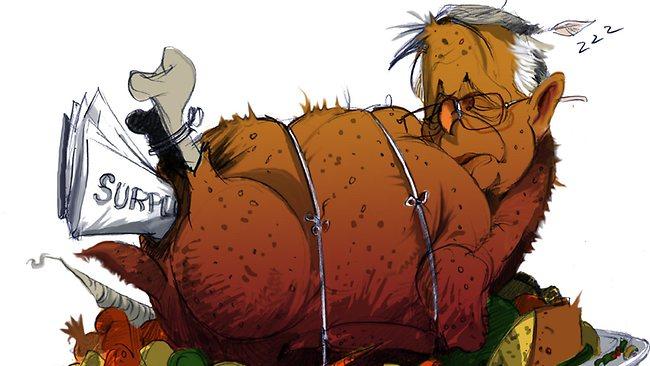
SOMETHING fishy has happened to prices for our feathered friends. Not only has this year's Christmas Price Index, which calculates the cost of buying the gifts specified in the Twelve Days of Christmas, increased by 3.7 per cent, well above the Reserve Bank's inflation target, but prices for turtle doves, French hens and calling birds all spiked in 2012, rising by 25 per cent or more. Even swans, which at more than $1000 each already squeezed the family purse, have increased by a hefty 8 per cent.
Fowl play can hardly be ruled out. Is there really a swan deficit? Or does the market fear their extinction, at least of the parliamentary variety, with speculators sending swan prices soaring?
Whatever the causes, with our avian inflation rate 5 percentage points higher than that in the United States, Australian consumers are yet again copping the pain. But that doesn't mean American avian inflation, which last year ran at 11 per cent, is any cause for rejoicing.
Rather, as the US money supply has increased by a whopping 75 per cent since the Global Financial Crisis (as compared with a more prudent 19 per cent here), you don't need to be a monetarist to expect inflationary pressures to develop, especially with the flood of greenbacks pushing down the US exchange rate and raising US import prices.
Might resurgent bird prices be a wake-up call for the Fed?
Not that Americans need to be roused from their slumbers. For the other news this year is that while Australians are spending as much time as ever in dreamland, the rest of the world is sleeping less and less.
In fact, on one estimate (sources are listed on my blog), the average Australian aged 15 and over is now sleeping 20 minutes more each night than his or her counterparts in other advanced economies.
That amounts to some 18 potential working days sacrificed to the national passion for a kip.
Moreover, in the US and Europe, it is the most highly educated who are scaling back their sleep, making those hours available for other pursuits. In the land of the fair nap, however, there is no evidence of the best and brightest leaping ever earlier out of bed and thus squeezing that bit extra from their (heavily subsidised) human capital.
And, to make matters worse, the rot seems to set in early, entrenching our lifelong disadvantage. Internationally, the time children spend each day sleeping has fallen by around 45 seconds a year.
But not here, where annually the median ankle-biter enjoys an added 24 seconds a day in bed.
In short, this country is asleep at the wheel. Kevin Rudd, bless his soul, was on to it. Singlehandedly, he tried to make us the nation that never sleeps, sacrificing his own repose to slash the country's average. But dazed from insomnia, a good government lost its way, and sleepwalked into a wake of faceless men. Kevin has been catching up on his beauty sleep ever since.
However, the dawning of the Asian Century gives new hope. Building on its successful carbon tax, the government could introduce a Responsible Sleep Promotion Tax, or RSPT, with the goal that, by 2020, Australia will be among the world's five most sleep-deprived countries.
Under the RSPT, all Australians would have the right to a respectable seven hours sleep a night; but each minute above that would require a tradeable Nap Abatement Permit, with the number of free NAPs declining each year in line with a national sleep reduction trajectory.
The potential gains to GDP are obvious. And they would be all the greater as the scheme would ensure that odious pollutant, sleep, was abated efficiently. By selling their NAPs, those who least need sleep would make the greatest contribution to abatement, while hypersomnolents would face a market-based incentive to cure their affliction.
Until now, evolution, in its blindness, organised matters so that Craig Thomson could pay someone to sleep with him, but not for him; the Gillard government's RSPT would at last fix that.
International linkage of the scheme should push the gains even higher. As Sleepless in Seattle bought NAPs from Wakeful in Wagga, we would diversify away from loathsome mineral exports.
And imagine the budget windfall. Conventional economic models suggest more than an hour's wage is needed to induce people to give up even one hour's sleep, as sleep is both pleasurable in itself and increases daytime productivity. Yet setting the initial NAP price at a mere $1 an hour would raise over $6 billion, even if it only led to a 15 minute a day reduction in sleep.
Allowing the price to rise with the carbon tax could yield $20bn over the forward estimates. And with Labor redistributing every cent to working families, no Australian home would have to do without a festive swan of its own, much less a full complement of maids milking, ladies dancing and lords leaping, despite this year's price hikes.
So slip on the speedos, slop on the suntan and toss that well-worn copy of the Budget onto the barbie. For as L'il Abner sang in the 1950s musical: "The country's in the very best of hands . . . the Treasury says the national debt is climbing to the sky, And government expenditures have never been so high, It makes a fellow get a gleam of pride."
It certainly does. And who could want a better Christmas present than that?



